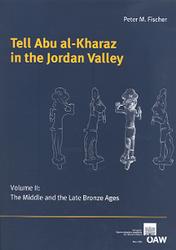
Tell Abu al-Kharaz, ein Siedlungshügel im zentralen transjordanischen Jordantal, wurde zwischen 1989 und 2001 unter der Leitung des Autors erforscht. Die Stadt blühte in der Frühbronzezeit und nach einer längeren Besiedlungslücke in der späten Mittelbronze- und Spätbronzezeit. Der vorliegende Band in einer Serie von drei Bänden (Band I: Frühbronzezeit, Band III: Eisenzeit) ist der erste abgeschlossene Bericht über eine Siedlung der Mittel- und Spätbronzezeit in Transjordanien. Ausgrabungs- und Bearbeitungsmethoden werden im Kapitel 1 beschrieben. Kapitel 2 präsentiert die Stratigraphie, die mit der Architektur, der Keramik und den Kleinfunden zusammen behandelt wird. Kapitel 3 ist der Typologie und Chronologie der keramischen Funde gewidmet. Weiters werden die verschiedenen Untergruppen der Chocolate-on-White Ware, die feinste Keramik Palästinas, und Importe, die hauptsächlich aus Zypern kamen, beschrieben und sowohl typologisch als auch chronologisch klassifiziert. Kapitel 4 beschreibt die Steinwerkzeuge, und die Kapitel 5–7 präsentieren die Resultate der Atomabsorptionsanalysen von Kupfer- und Bronzeobjekten, die Untersuchungen der Flora und Fauna und die Ergebnisse der C-14 Datierungen. Kapitel 8 umfasst eine generelle Zusammenfassung der Resultate: Umweltfragen, die Art der Besiedlung, die Anzahl der Einwohner und die mögliche Verwaltung der Stadt, die Architektur der acht Besiedlungen der Mittel- und Spätbronzezeit, die Keramik, die Kleinfunde, Handel und Handelswege werden diskutiert. Eine revidierte Terminologie sowie eine relative und absolute Chronologie werden präsentiert.
…
The multi-period town of Tell Abu al-Kharaz in the Trans-Jordanian Central Jordan Valley was excavated from 1989 to 2001 under the direction of the author. The town flourished during three main periods: the Early and Middle-Late Bronze Ages and the Iron Age. A long occupational lacuna occurred between the Early Bronze Age II and the second half of the Middle Bronze Age. The present publication is the third publication in a series and the first to deal with a Middle-Late Bronze Age settlement in Transjordan. Excavation and processing methods are described in detail in Chapter 1. Stratigraphy, architecture and pottery are presented as an integrated entity in Chapter 2. Chapter 3 presents typo-chronological conclusions and the diachronic development of common earthenware. The
enigmatic Chocolate-on-White Ware, which can be regarded as Palestine's most sophisticated earthenware, and imported earthenware, mainly from Cyprus, are studied. Chapter 4 deals with the lithics, and Chapters 5–7 with atomic-absorption spectroscopy of copper and copper alloys, the climate, the fauna and flora, and radiocarbon datings. The final chapter, "Discussions and Conclusions", takes a detailed look at the general and specific environment, the settlement, the people and their administration as well as population statistics. This chapter also contains a synthesis of the architecture during the eight phases of the Middle and Late Bronze Age occupation, as well as of the pottery and small finds. A reconstruction of the town's economy, trade and trading routes is also presented. The chronological discussion includes a slightly revised terminology and periodization for the late Middle and Late Bronze Ages in addition to the discussion on relative and absolute chronology.
2006,
978-3-7001-3815-0
978-3-7001-3868-6
385 Seiten, zahlr. Abb.,
30,5x23,5cm, broschiert